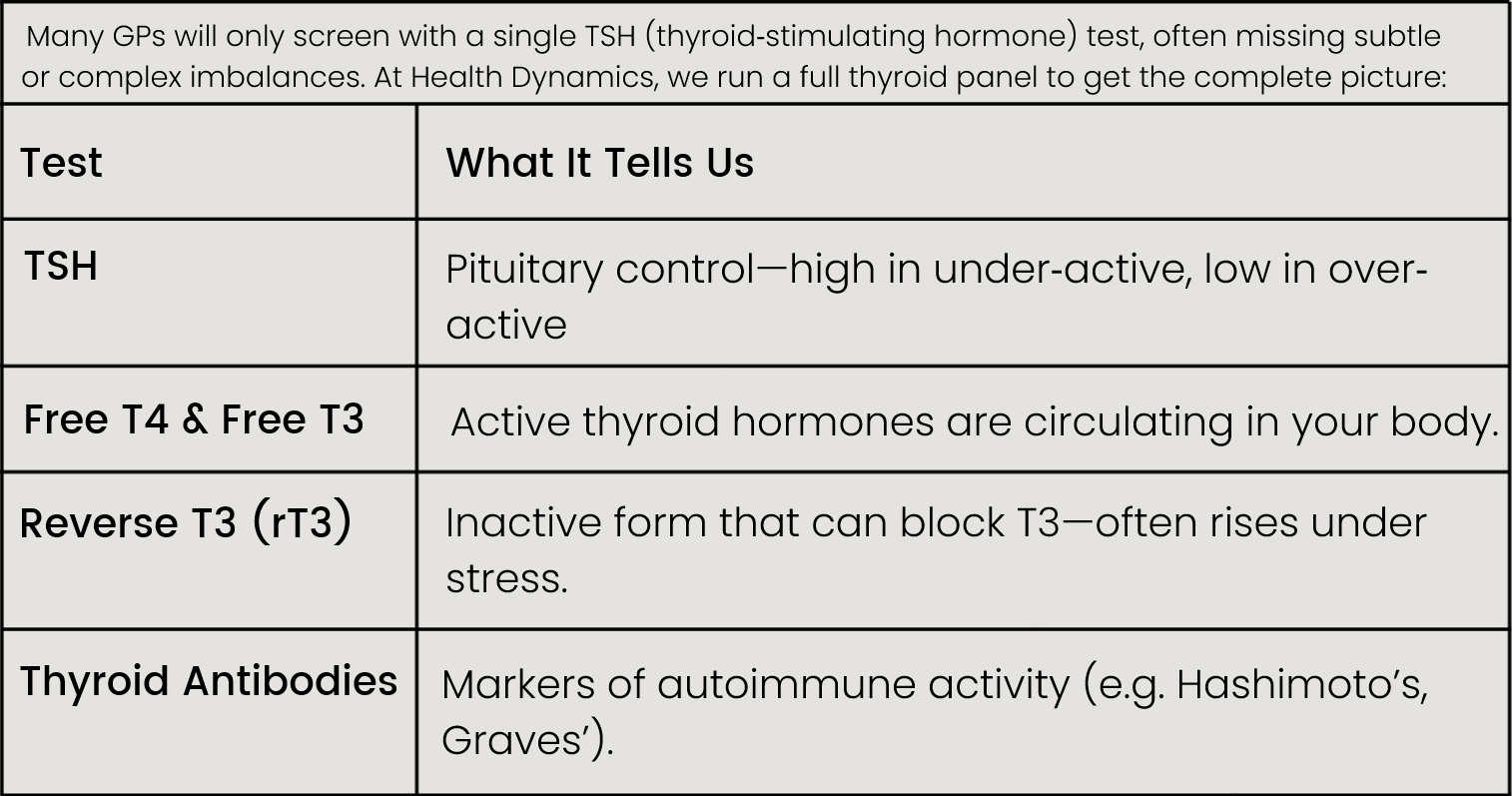Thyroid Health: The Silent Conductor of Your Body’s Rhythm
“You’re not lazy or broken—your thyroid might be on strike. Here’s the testing your doctor isn’t doing (and why it matters).”
Often overlooked, your thyroid is a small gland with a mighty role. Positioned at the base of your throat, it secretes hormones that regulate metabolism, energy levels, mood and even your body temperature. When the thyroid falls out of balance, whether it’s under‑active (hypothyroidism) or over‑active (hyperthyroidism), you can experience fatigue, weight changes, brain fog, hair loss and hormonal ups and downs. Understanding and supporting thyroid health is essential for vibrant well-being.
What Dr Deepak Chopra Says
Dr Deepak Chopra, MBBS, a former board‑certified endocrinologist, grew frustrated prescribing medications that merely masked symptoms without addressing the root cause. He left conventional medicine to train in Ayurveda and has become one of the world’s foremost voices on mind‑body healing. He views the thyroid as not just a hormonal factory but as the “conductor” of our body’s metabolic orchestra. In his writings, he emphasises the mind‑body connection:
“Our thoughts and emotions have direct access to our endocrine system—by calming the mind, we bring harmony to our hormones.”
In practice, this means that stress management, meditation and breathing exercises are as important as nutrition and herbs when it comes to thyroid balance.
What Dr Deepak Chopra Says
Dr Deepak Chopra, MBBS, a former board‑certified endocrinologist, grew frustrated prescribing medications that merely masked symptoms without addressing the root cause. He left conventional medicine to train in Ayurveda and has become one of the world’s foremost voices on mind‑body healing. He views the thyroid as not just a hormonal factory but as the “conductor” of our body’s metabolic orchestra. In his writings, he emphasises the mind‑body connection:
“Our thoughts and emotions have direct access to our endocrine system—by calming the mind, we bring harmony to our hormones.”
In practice, this means that stress management, meditation and breathing exercises are as important as nutrition and herbs when it comes to thyroid balance.
An Ayurvedic Perspective on Thyroid Health
In Ayurveda, thyroid imbalance is often related to disturbances in Agni (digestive fire) and the Doshas:
Vata Dosha (Air & Ether)
When Vata rises, its light, dry and mobile qualities can suppress your Agni (digestive fire) and slow down thyroid function, manifesting as classic hypothyroid signs:
- Cold Intolerance & Chilliness: Vata’s cool nature lowers your body temperature and circulation, leaving you feeling perpetually cold.
- Dryness & Brittle Hair/Skin: Vata dries out tissues, so you may notice flaky skin, coarse hair and rough nails.
- Sluggishness & Mental Fog: Over‑agitated mind‑body rhythms paradoxically lead to fatigue, scattered thinking and procrastination.
Ayurvedic Support for Vata‑Related Thyroid Sluggishness
- Diet: Emphasise warm, nourishing, oily foods like cooked porridges, stewed fruits and ghee‑drizzled vegetables
- Lifestyle: Gentle oil massage (Abhyanga) each evening with warm sesame oil calms Vata and improves circulation; keep to a regular daily routine with early meals and bedtimes.
Pitta Dosha (Fire & Water)
When Pitta overheats, its fiery intensity may overstimulate the thyroid, triggering hyperthyroid‑like symptoms:
- Heat Intolerance & Sweating: Excess internal heat from Pitta ramps up metabolism and body temperature, causing hot flashes and night sweats.
- Irritability & Restlessness: The sharp, penetrating quality of Pitta can heighten anxiety, impatience and emotional volatility.
- Rapid Heartbeat & Weight Loss: Accelerated circulation and digestion may lead to palpitations, loose stools and unintentional weight loss.
Ayurvedic Support for Pitta‑Related Thyroid Overactivity
- Diet: Choose cooling, hydrating foods, cucumber, coconut water, sweet fruits and basmati rice; minimise spicy, sour and salty tastes.
- Lifestyle: Incorporate calming pranayama, restorative yoga and time in nature to cool Pitta’s flames.
Kapha Dosha (Earth & Water)
Excess Kapha brings heaviness and stagnation, which can overwhelm thyroid signalling and slow metabolism, often leading to:
- Weight Gain & Puffiness: Kapha’s dense, moist qualities encourage fluid retention and fat storage, especially around the midsection and face.
- Lethargy & Brain Fog: The sluggish weight of Kapha creates inertia in both body and mind, making you feel “stuck” and unmotivated.
- Mucus & Congestion: Imbalanced Kapha can thicken bodily fluids, contributing to sinus issues and sluggish lymphatic drainage.
Ayurvedic Support for Kapha‑Related Thyroid Sluggishness
- Diet: Focus on light, dry, warming foods, spiced broths, bitter greens, lentils and grains like quinoa or millet.
- Lifestyle: Energising activities—brisk walking, dry brushing and morning Sun salutations—stimulate lymph flow and uplift Kapha’s heaviness.
Balancing your Doshas is a cornerstone of Ayurvedic thyroid care—by tailoring diet, herbs and daily habits to your unique doshic profile, you support your thyroid’s harmony and address the root cause of imbalance.
- Vata Dosha (air & ether): When elevated, it can lead to hypothyroid symptoms, cold intolerance, dryness, and sluggishness.
- Kapha Dosha (earth & water): Excess can contribute to weight gain, fluid retention and lethargy.
- Pitta Dosha (fire & water): Pitta imbalance may underlie hyperthyroid signs, heat intolerance, irritability, and rapid heartbeat.
Ayurvedic approaches focus on:
- Kindling Agni, your (digestive fire): with warming, easy‑to‑digest foods (e.g. spiced soups, steamed vegetables).
- Clearing Āma (toxins) through gentle detoxification, we use Triphala powders or seasonal cleansing.
- Balancing the Doshas (your body Type) with personalised diet, lifestyle and herbal formulas, we use to balance the body type.
Why Comprehensive Lab Testing Matters

Why GPs may stop at TSH: Medicare rebates often cover only TSH, and if results fall within a narrow “normal” range, further tests are rarely ordered, despite many patients feeling symptomatic.
By measuring all these markers, we can:
- Detect early or “sub‑clinical” thyroid dysfunction
- Uncover stress‑driven hormone blocks (elevated rT3)
Identify autoimmune triggers before tissue damage occurs
Integrating Labs with Ayurvedic Care
Once we have your detailed lab results, we weave together:
- Dietary adjustments that support your unique dosha profile
- Herbal blends to nourish your thyroid and clear Āma (toxins)
- Mind‑body practices (meditation, pranayama) to soothe the neuro‑endocrine axis
- Targeted nutrients (selenium, zinc, vitamin D) to support hormone synthesis and immune balance
This holistic approach aligns with Deepak Chopra’s teaching that true healing addresses both the inner landscape (mind, spirit) and the outer terrain (body, biochemistry).
Participatory Health: Be Your Own Healer
When you “participate” in your health rather than remain a passive “patient,” you become deeply educated about how your body functions, even in “small” systems like the thyroid. Understanding these details empowers you to uncover why your thyroid isn’t working optimally and how that imbalance ripples through your energy, mood, weight and beyond.

